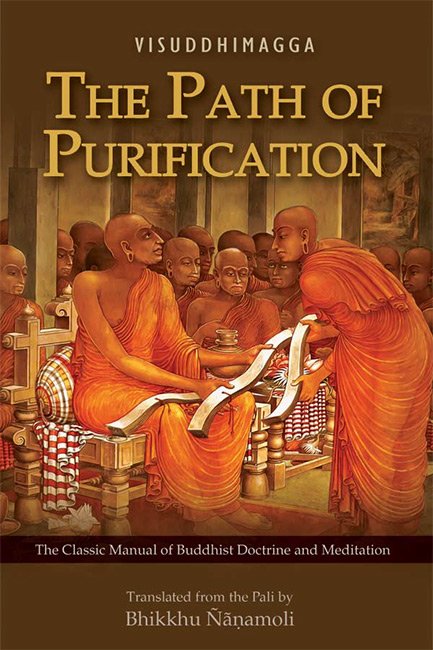Visuddhimagga (the pah of purification)
by Ñāṇamoli Bhikkhu | 1956 | 388,207 words | ISBN-10: 9552400236 | ISBN-13: 9789552400236
This page describes General (conclusion to the six recollections) of the section Six Recollections (Cha-anussati-niddesa) of Part 2 Concentration (Samādhi) of the English translation of the Visuddhimagga (‘the path of purification’) which represents a detailled Buddhist meditation manual, covering all the essential teachings of Buddha as taught in the Pali Tipitaka. It was compiled Buddhaghosa around the 5th Century.
General (conclusion to the six recollections)
119. Now, in setting forth the detail of these recollections, after the words, “His mind has rectitude on that occasion, being inspired by the Perfect One,” it is added: “When a noble disciple’s mind has rectitude, Mahānāma, the meaning inspires him, the law inspires him, and the application of the law makes him glad. When he is glad, happiness is born in him” (A III 285–88). Herein, the meaning inspires him should be understood as said of contentment inspired by the meaning beginning, “This Blessed One is such since he is …” (§2). The law inspires him is said of contentment inspired by the text. The application of the law makes him glad is said of both (cf. M-a I 173).
120. And when in the case of the recollection of deities inspired by deities is said, this should be understood as said either of the consciousness that occurs in the prior stage inspired by deities or of the consciousness [that occurs in the later stage] inspired by the special qualities that are similar to those of the deities and are productive of the deities’ state (cf. §117).
121. These six recollections succeed only in noble disciples. For the special qualities of the Enlightened One, the Law, and the Community, are evident to them; and they possess the virtue with the special qualities of untornness, etc., the generosity that is free from stain by avarice, and the special qualities of faith, etc., similar to those of deities.
122. And in the Mahānāma Sutta (A III 285 f.) they are expounded in detail by the Blessed One in order to show a stream-winner an abiding to depend upon when he asked for one.
123. Also in the Gedha Sutta they are expounded in order that a noble disciple should purify his consciousness by means of the recollections and so attain further purification in the ultimate sense thus: “Here, bhikkhus, a noble disciple recollects the Perfect One in this way: That Blessed One is such since he is accomplished … His mind has rectitude on that occasion. He has renounced, [227] got free from, emerged from cupidity. Cupidity, bhikkhus, is a term for the five cords of sense desire. Some beings gain purity here by making this [recollection] their prop” (A III 312).
124. And in the Sambādhokāsa Sutta taught by the venerable Mahā-Kaccāna they are expounded as the realization of the wide-open through the susceptibility of purification that exists in the ultimate sense only in a noble disciple thus: “It is wonderful, friends, it is marvellous how the realization of the wide-open in the crowded [house life] has been discovered by the Blessed One who knows and sees, accomplished and fully enlightened, for the purification of beings, [for the surmounting of sorrow and lamentation, for the ending of pain and grief, for the attainment of the true way], for the realization of Nibbāna, that is to say, the six stations of recollection. What six? Here, friends, a noble disciple recollects the Perfect One … Some beings are susceptible to purification in this way” (A III 314–15).
125. Also in the Uposatha Sutta they are expounded in order to show the greatness of the fruit of the Uposatha, as a mind-purifying meditation subject for a noble disciple who is observing the Uposatha: “And what is the Noble Ones’ Uposatha, Visākhā? It is the gradual cleansing of the mind still sullied by imperfections. And what is the gradual cleansing of the mind still sullied by imperfections? Here, Visākhā, a noble disciple recollects the Perfect One …” (A I 206–11).
126. And in the Book of Elevens, when a noble disciple has asked, “Venerable sir, in what way should we abide who abide in various ways?” (A V 328), they are expounded to him in order to show the way of abiding in this way: “One who has faith is successful, Mahānāma, not one who has no faith. One who is energetic … One whose mindfulness is established … One who is concentrated … One who has understanding is successful, Mahānāma, not one who has no understanding. Having established yourself in these five things, Mahānāma, you should develop six things. Here, Mahānāma, you should recollect the Perfect One: That Blessed One is such since …” (A V 329–32).
127. Still, though this is so, they can be brought to mind by an ordinary man too, if he possesses the special qualities of purified virtue, and the rest. [228] For when he is recollecting the special qualities of the Buddha, etc., even only according to hearsay, his consciousness settles down, by virtue of which the hindrances are suppressed. In his supreme gladness he initiates insight, and he even attains to Arahantship, like the Elder Phussadeva who dwelt at Kaṭakandhakāra.
128. That venerable one, it seems, saw a figure of the Enlightened One created by Māra. He thought, “How good this appears despite its having greed, hate and delusion! What can the Blessed One’s goodness have been like? For he was quite without greed, hate and delusion!” He acquired happiness with the Blessed One as object, and by augmenting his insight he reached Arahantship.
The seventh chapter called “The Description of Six Recollections” in the Treatise on the Development of Concentration in the Path of Purification composed for the purpose of gladdening good people.
